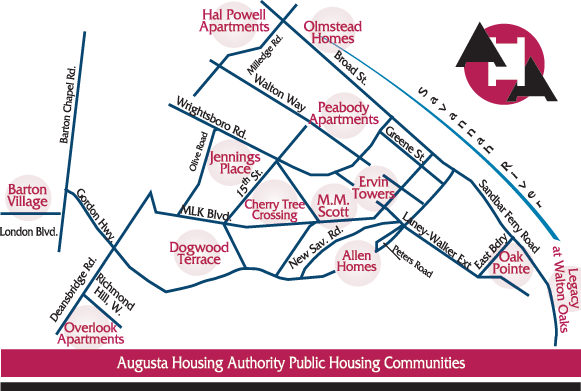Public housing was established through the U.S. Housing Act of
1937 to provide decent and safe rental housing for eligible
low-income families, the elderly, and persons with disabilities.
Public housing comes in all sizes and types, from scattered single
family houses to high-rise apartments for elderly families. There
are approximately 1.3 million households living in public housing
units, managed by some 3,300 HAs. The
U.S. Department of Housing and Urban Development (HUD)
administers Federal aid to local housing agencies (HAs) that manage
the housing for low-income residents at rents they can afford. HUD
furnishes technical and professional assistance in planning,
developing and managing these developments.

The Public Housing
Program is divided in four (4) areas which consist of:
Allen Homes, MM Scott, Oak Pointe, Cherry Tree Crossing,
Peabody Apartments, Hal Powell, Ervin Towers, Olmstead Homes,
Jennings Place, Dogwood Terrace, Barton Village (some areas), 12
units at Legacy at Walton Oaks and Overlook Apartments.
You can have visitors, and you are responsible for their
code of conduct. Guests will be permitted to stay on the premises
for only fourteen days.
Yes,
you can have a pet that fits within AHA regulations. The regulations
require a $300 pet deposit and set some limits on the type and size
of the pet.
The
Augusta Housing Authority does not provide emergency housing. Urban
Ministries of Augusta, Equal Opportunity Authority, Interfaith
Hospitality Network. Salvation Army, or Beulah Grove Resource Center
are all good places to start looking for crisis assistance. Also the
United Way of the CSRA has a 211 telephone number that can put you
in contact with help.
Once your name
comes to the top of the waiting list, AHA staff will review your
information to determine eligibility.
Please click on the "Community Service Requirement" picture below for more information.

Community serivce activities may include volunteer work in a local school, hospital, or childcare center,
working with youth organizations, or participation in programs that stregthen resident responsibilty such as household budgeting, credit counseling or drug and alcohol abuse counseling
and treatment. You may also view a list of pre-approved locations.
|